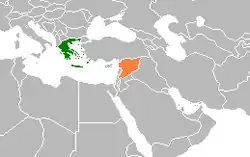Greece–Syria relations
Greece-Syria relations are foreign relations between Greece and Syria. Greece has an embassy in Damascus and 3 honorary consulates (in Latakia, Tartus and Aleppo). Syria has an embassy in Athens. Both countries are charter members of the Union of the Mediterranean.
 | |
Greece |
Syria |
|---|---|
History
Ancient
The first contact between the two Mediterranean nations started with Cadmus introducing Phoenician Alphabet to ancient Greece. In addition, Ugarit in Syria had also contact with Messinia and the Minoan civilization,[1] until it was destroyed by the Sea People.
Hellenistic era
Macedonian Greek king, Alexander the Great conquered Syria and the region in 333–332 BCE. Afterwards, Seleucus led the Seleucid Empire to rule Syria, which lasted until 64 BCE. In Syria, Seleucids had many achievements such as building cities like Antioch, Laodicea, and Apamea, in addition to laying the foundations to the Aleppo Citadel.
Late on, the Byzantine Empire kept the Greek influence until mid-7th century, in which they developed the Norias of Hama. During the Byzantine rule, the Eastern Orthodox Church was the common religion between the two nations, which still has 503,000 members in Syria.[2]
Pre-WWI
Both Greece and Syria were occupied by the Ottoman Empire for more than four centuries.
Modern era
During the WWII, many Greeks fled their country after the Nazi invasion, mainly from the island of Chios to seek refuge in Al-Nayrab camp, near Aleppo.[3] During the Syrian Civil War, thousands of Syrians went to Greece and Europe to escape war in their country.
On May 8, 2020, the Greek Foreign Ministry Nikos Dendias announced a restoration of relations between Greece and Syria and assigned former ambassador to Syria and Russia, Tasia Athanassiou, as a Special Envoy of Greece's Foreign Ministry for Syria.[4]
In July 2020, Syria initiated the construction of a Russian-funded replica of Hagia Sophia in the predominantly Christian town of Al-Suqaylabiyah.[5]
References
- "Ugarit". Britannica.
- "Why is Greece mending relations with Assad?". Middle East Eye. 5 August 2020.
- "The Greek refugees who fled to the Middle East in WW2". BBC. 19 June 2016.
- "Greece's renewed relations with Syria further isolates Turkey in the Eastern Mediterranean". greekcitytimes.com. 8 May 2020.
- "Russia to fund small-scale replica Hagia Sophia in Syria that will be used as a church". The Art Newspaper. 6 August 2020.

